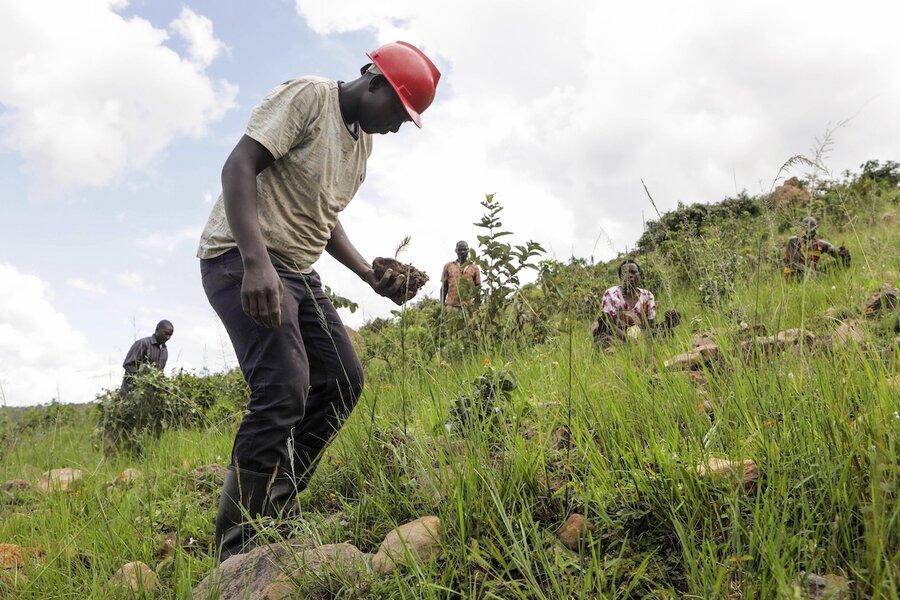African refugees put down roots in Uganda. Now, they plant seeds.
Loading...
| Nakivale, Uganda
Enock Twagirayesu was seeking sanctuary when he and his family fled violence in Burundi, and they found it in Uganda, the small East African nation that has absorbed thousands of refugees from unsettled neighbors.
Mr. Twagirayesu’s family has grown from two children when they arrived more than a decade ago to eight now, a boon for the family but also a marker of the immense pressure the Nakivale Refugee Settlement has put on the landscape near the Tanzania border.
What was wide forest cover two decades ago is now mostly gone, cut down for cooking fuel. When Mr. Twagirayesu saw women digging up roots to burn a few years ago, he knew it was time to act.
“We saw that in the days to come, when the trees are finished, we will also be finished,” he said. “Because if there are no trees to be used for cooking even the people cannot survive.”
He and two other refugees began planting trees in 2016, and Mr. Twagirayesu, who had sewn for a living back home, turned out to have a gift for mobilizing people. That early group quickly grew, and he now leads the Nakivale Green Environment Association to carry out what Mr. Twagirayesu calls the urgent business of reforesting.
“A tree is not like beans or maize, which you plant and tomorrow you will get something to eat. Planting trees is challenging,” he said.
Deforestation is a national issue in Uganda, where most people use firewood for cooking, trees are often cut to make charcoal for export, and some forests fall to illegal logging. The country has lost 13% of its tree cover since 2000, according to Global Forest Watch.
Nakivale, sparsely populated by locals, is one of the few territories in Uganda that could accommodate many refugees. More than 180,000 live there now, with regular new arrivals.
They come from neighboring countries such as Congo, where sporadic violence means an influx of arrivals heading toward Nakivale. There are Rwandan refugees still living in Nakivale who first arrived there shortly after the 1994 genocide. After the refugees are registered, they are allocated small plots of land upon which they can build homes and plant gardens.
Nsamizi Training Institute for Social Development, a local organization, is supporting the tree-planting activities of Twagirayesu and others. The institute’s yearly goal is to plant 300,000 trees, with about 3 million planted in recent years, said Cleous Bwambale, who is in charge of monitoring and evaluation for the institute.
On one recent afternoon, a group of refugees were busy planting thousands of pine seedlings on the rocky, steep side of a hill facing the Kabahinda Primary School. In scorching heat, they attacked solid ground with pickaxes and hoes before carefully tucking the seedlings into the earth. Nearly all of the workers have children enrolled at the government-owned but donor-supported school.
Deputy Headteacher Racheal Kekirunga said heavy rains in the valley bring the school to a standstill as stormwater races down the hill and runs through the yard, forcing teachers and students to stay inside.
“We hope that when we plant these trees it will help us to reduce on the running water that could affect our school, and our school gardens,” Ms. Kekirunga said. “Especially our learning and teaching. When the rain is too heavy, you must wait until it reduces and then you go to class.”
The Nsamizi institute, serving as an implementing partner in Nakivale for the U.N. refugee agency, collaborates with mobilizers like Twagirayesu in four parts of the 185-square-kilometer (71-square-mile) settlement, according to the U.N. refugee agency. The institute encourages refugees with small cash payments for specific work done, maps out plans to reforest specific blocks of land and provides seedlings.
Mr. Twagirayesu said his group has planted at least 460,000 trees in Nakivale, creating woodlots of varying sizes and ages. They include pine, acacia, and even bamboo. That success has come despite fears among some in the settlement that the authorities, wanting to protect mature woodlots, one day might force the refugees to go back home.
“We got a problem because some people were saying that when they plant trees, they will be chased away,” he said. “Teaching people to plant trees also became a war. But right now, after they saw us continue to plant trees, saw us getting firewood, they began to appreciate our work.”
While he isn’t done yet as a tree planter, Mr. Twagirayesu said, “when we are walking in the places where we planted trees we feel much happiness.”
This story was reported by The Associated Press.







